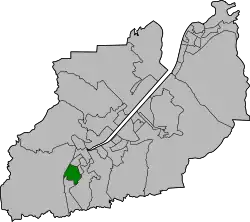| Keng Hau | |
|---|---|
| Elected constituency for the Sha Tin District Council | |
 Boundary of Keng Hauin Sha Tin District | |
| District | Sha Tin |
| Legislative Council constituency | New Territories North East |
| Population | 19,588 (2019)[1] |
| Electorate | 13,023 (2019)[2] |
| Current constituency | |
| Created | 1994 |
| Number of members | One |
| Member(s) | Vacant |
Keng Hau is one of the 41 constituencies in the Sha Tin District in Hong Kong.
The constituency returns one district councillor to the Sha Tin District Council, with an election every four years.
Keng Hau constituency is loosely based on part of the public estates Hin Yiu Estate and Hin Keng Estate, villages Ha Keng Hau, Sheung Keng Hau, and private housing estates Parc Royale and Julimount Garden, with an estimated population of 19,588.[3]
Councillors represented
| Election | Member | Party | |
|---|---|---|---|
| 1994 | Wai Kwok-hung | Civil Force | |
| 1999 | |||
| 2003 | |||
| 2007 | |||
| 2011 | Ng Kam-hung→Vacant | Democratic | |
| 2015 | Democratic→Community Sha Tin | ||
| 2019 | Community Sha Tin→Independent | ||
Election results
2010s
| Party | Candidate | Votes | % | ±% | |
|---|---|---|---|---|---|
| Nonpartisan | Ng Kam-hung | 5,453 | 60.11 | +3.21 | |
| NPP (Civil Force) | Cheung Pak-yuen | 3,443 | 37.95 | −5.15 | |
| Independent | Lok Chung-yau | 176 | 1.94 | ||
| Majority | 2,010 | 22.16 | |||
| Turnout | 9,101 | 69.91 | |||
| Nonpartisan hold | Swing | ||||
| Party | Candidate | Votes | % | ±% | |
|---|---|---|---|---|---|
| Democratic | Ng Kam-hung | 2,826 | 56.9 | +6.7 | |
| NPP (Civil Force) | George Ho Kwok-wah | 2,144 | 43.1 | −6.7 | |
| Majority | 685 | 13.8 | +10.8 | ||
| Turnout | 4,970 | 41.7 | +9.7 | ||
| Democratic hold | Swing | +6.7 | |||
| Party | Candidate | Votes | % | ±% | |
|---|---|---|---|---|---|
| Democratic | Daniel Ng Kam-hung | 1,873 | 50.2 | ||
| Civil Force | Wong Ka-sek | 1,855 | 49.8 | −21.5 | |
| Majority | 18 | 0.4 | −42.2 | ||
| Turnout | 3,728 | 32.0 | |||
| Democratic gain from Civil Force | Swing | ||||
2000s
| Party | Candidate | Votes | % | ±% | |
|---|---|---|---|---|---|
| Civil Force | Wai Kwok-hung | 2,058 | 71.3 | −5.0 | |
| Independent | Leung Chung-ling | 827 | 28.7 | +5.0 | |
| Majority | 1,231 | 42.6 | −0.6 | ||
| Civil Force hold | Swing | ||||
| Party | Candidate | Votes | % | ±% | |
|---|---|---|---|---|---|
| Civil Force | Wai Kwok-hung | 2,206 | 76.3 | +4.7 | |
| Independent | Leung Chung-ling | 685 | 23.7 | ||
| Majority | 2,348 | 65.7 | +44.7 | ||
| Democratic hold | Swing | ||||
1990s
| Party | Candidate | Votes | % | ±% | |
|---|---|---|---|---|---|
| Civil Force | Wai Kwok-hung | 2,210 | 71.6 | +7.1 | |
| Frontier | Helen Yeung Yuk-kuen | 876 | 28.4 | ||
| Majority | 1,334 | 43.2 | +14.2 | ||
| Civil Force hold | Swing | ||||
| Party | Candidate | Votes | % | ±% | |
|---|---|---|---|---|---|
| Civil Force | Wai Kwok-hung | 1,508 | 64.5 | ||
| Liberal | Kwong Kwan-ming | 829 | 35.5 | ||
| Majority | 679 | 29.0 | |||
| Civil Force win (new seat) | |||||
References
- ↑ "Recommended District Council Constituency Areas" (PDF). Electoral Affairs Commission.
- ↑ "Age and Sex profile of registered electors by 452 District Council Constituency Areas in 2019" (PDF). Registration and Electoral Office. Archived from the original (PDF) on 9 May 2020. Retrieved 16 November 2019.
- ↑ "2015 District Councils Election - Summary of the District Council Constituency Areas". Hong Kong Government.
This article is issued from Wikipedia. The text is licensed under Creative Commons - Attribution - Sharealike. Additional terms may apply for the media files.